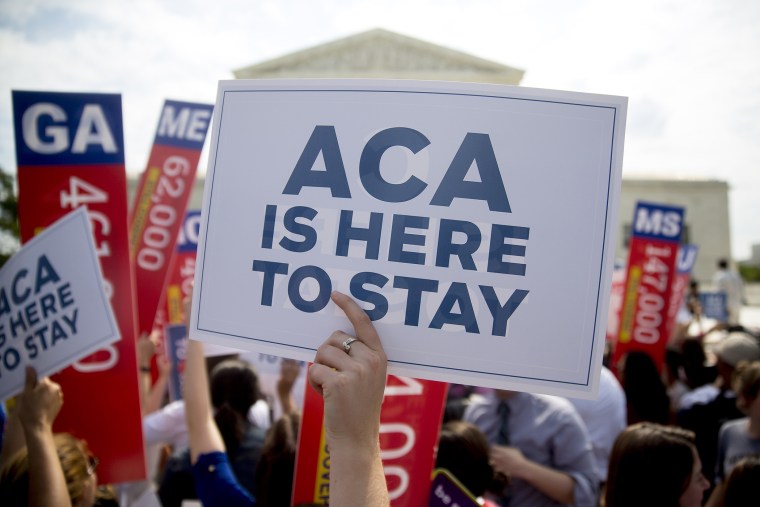Exactly six years ago tomorrow, President Obama signed the Affordable Care Act into law, vowing that the landmark reform effort would reduce the nation's uninsured rate while bringing renewed health security to tens of millions more. By every metric, "Obamacare" has delivered on its goals.
For the ACA's Republican critics, however, the challenges associated with condemning the successful law keep getting worse. Some on the right try to pretend the evidence doesn't exist -- some in the GOP argue that the uninsured rate hasn't improved, for example, facts be damned -- while other conservatives argue that the good news is simply coincidental. More Americans have received coverage as the economy has improved, they argue, so the Affordable Care Act deserves no credit.
Those who simply pretend not to see reality are obviously foolish, but the notion that the economy, not the ACA, reduced the uninsured rate to record lows is more interesting. Is there anything to this? The Associated Press took a closer look yesterday.
There's growing evidence that most of the dramatic gain in the number of Americans with health care coverage is due to President Barack Obama's law, and not the gradual recovery of the nation's economy. [...] "It's very clear that the Affordable Care Act has done most of the work in decreasing the number of uninsured," said economist Robert Kaestner of the University of Illinois at Chicago. [...] "This kind of shift in insurance I don't think can be explained by the economy," economist Christine Eibner of the RAND Corporation said. "The increase (in coverage) is large enough that it can't be driven by just economic recovery."
Obamacare critics will, once again, have to look elsewhere for rhetorical ammunition.
The broader point of the AP piece was that the law's successes "could pose a political risk for Republicans.... While the health care law remains highly unpopular in the party, the prospect of taking away health care coverage from millions of people could trigger a backlash if the eventual GOP nominee's plan to replace it is seen as coming up short."
At least in theory, that's true. Mitt Romney and congressional Republicans made ACA repeal a key element of their 2012 platform, but at the time, the Affordable Care Act had not yet been fully implemented, and many of its most important provisions had not yet taken root.
Whether the right likes it or not, this year will be different. "Obamacare" is a long way from being popular, and even many Americans who gain quite a bit from the law don't realize that the ACA is the source of their benefits.
But it's nevertheless true that 2016 will be the first cycle in which Republicans, in earnest, take a risk by running on a national platform of, "We promise to start deliberately taking health security from millions of families."
